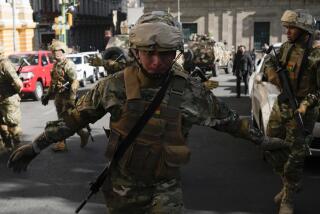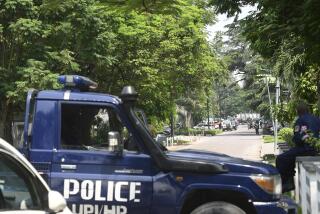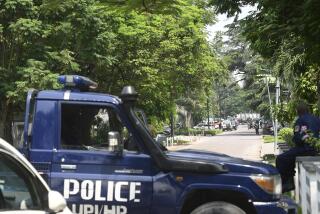Burundi’s President Seized in Army Coup : Africa: Ndadaye is reported slain. Ouster halts nation’s transition to democracy, stirs fears of new ethnic conflict.
- Share via
NAIROBI, Kenya — The president of Burundi was seized Thursday in an army coup that halted the tiny Central African nation’s transition to democracy and stirred fears of new ethnic bloodletting.
In Belgium, Burundi’s former colonial ruler, BRTN radio said unidentified sources reported the rebels had killed President Melchior Ndadaye. The radio said Burundi’s neighbor, Rwanda, broadcast similar reports but that none had been confirmed.
Earlier reports from Burundi said Ndadaye, 40, and three Cabinet ministers were being held at a military base near the capital, Bujumbura, and a search reportedly was under way for other leading government figures.
Burundi’s minister of information told state radio in neighboring Rwanda that soldiers were putting down resistance to the coup and that he and other government officials went into hiding in the capital after Ndadaye was seized.
The United States and other Western countries condemned the assault on Burundi’s infant democracy and suspended millions of dollars in aid.
The Burundi Embassy in Rwanda said the coup was masterminded by former President Jean-Baptiste Bagaza and led by the army’s chief of staff, Col. Jean Bikomagu. The coup leaders belong to the minority Tutsi tribe, while Ndadaye belongs to the majority Hutus.
Burundi, a mountainous country about the size of New Hampshire and with a population of 5.4 million, lies on the northeast side of Lake Tanganyika and is bordered by Tanzania, Rwanda and Zaire. Its people survive mostly on subsistence agriculture.
Tens of thousands have been killed in periodic clashes between Hutus and Tutsis since the country won its independence from Belgium in 1962. Although a minority, the Tutsis dominated Burundi’s government and economy until Ndadaye became the first democratically elected president in June.
Communications to Burundi were cut, and it could not be determined if there were any casualties when the army stormed the national palace before dawn.
“There was an exchange of gunfire between loyal forces and the mutineering soldiers throughout the night,” the information minister told Radio Rwanda.
Hutus make up about 85% of the population; the army is dominated by Tutsis. Radio Rwanda said most soldiers were supporting the coup.
Amnesty International reported last year that at least 1,000 Hutus were killed by soldiers following rebel attacks in 1991. Similar clashes took place in 1965, 1969, 1972 and 1988, with an estimated 20,000 dying in 1988 and an unconfirmed estimate of up to 100,000 killed in 1972.
More to Read
Sign up for Essential California
The most important California stories and recommendations in your inbox every morning.
You may occasionally receive promotional content from the Los Angeles Times.













